This morning, we leave Deadhorse to return to Fairbanks. We will make it to Marion Creek Campground. Unlike the two campgrounds on the way to Deadhorse, Marion Creek Campground is the most modern: it has a water pump and a campground host. Having a water pump available is nice so that we are able to refill our water vessels. One major concern for us on our trip from Fairbanks to Prudhoe Bay and back was the lack of food and water (and gas) supplies available along the Dalton Highway. We purchased five to seven days of food that we carried with us for the entire time that we traveled. Except for our time in Deadhorse we ate the food from the coolers. Lots of bagels and sandwiches were eaten.
The Dalton Highway and the Trans-Alaska pipeline are fairly close together for the whole trip. Sometimes the pipeline is buried and sometimes the pipeline is above the ground. There are many times when the pipeline is not visible from the road. This was a little surprising to me as I expected the pipeline to be in view most of the time.
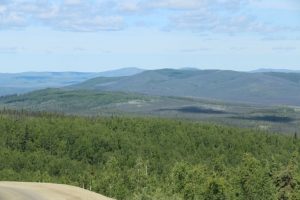
Pipeline farther away
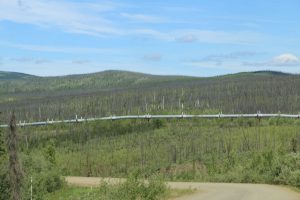
Pipeline closer to road
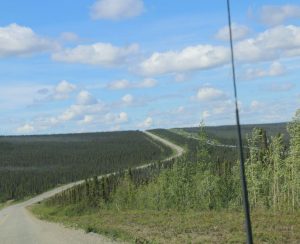
Road and pipeline close
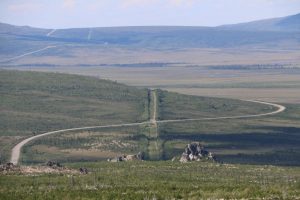
Pipeline buried
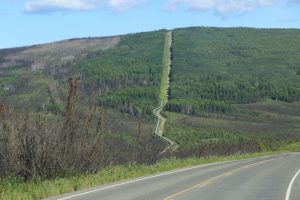
Pipeline
Driving back toward Fairbanks today, we see several herds of caribou and musk ox.
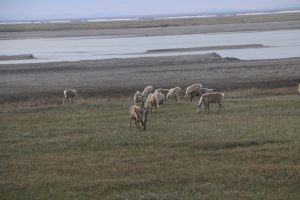
Caribou
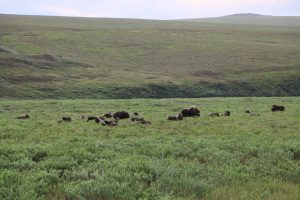
Musk Ox
We stopped for lunch at Galbraith Lake campground — a very nice second visit. During lunch we had a very good debrief of our trip to Deadhorse and especially the Prudhoe Bay oil fields and the Arctic Ocean. These debriefs are one of the great benefits to these interdisciplinary courses. Each student observes something slightly (or not so slightly) different from another student. During these debriefing periods all students have a chance to share their observations and thoughts. The visit to the Prudhoe Bay oil fields helped students (and professors) to catch a small glimpse of the large footprint that the oil industry has on our society.
Approximately one third of jobs in Alaska are associated with the oil industry. The Alaska Permanent Fund dispenses payments each year to residents of Alaska. This fund was set up when the Trans-Alaska Pipeline was built so that all Alaskans would benefit from the oil transferred through the pipeline. The people of Alaska tend to have a positive view of the pipeline.
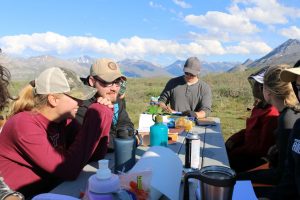
Debrief during lunch
We stopped at one beautiful lake later in the afternoon. Unfortunately, no one remembers the name of the lake.
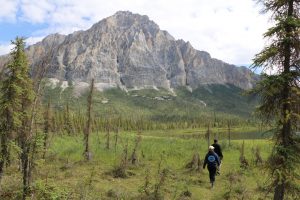
Beautiful Lake
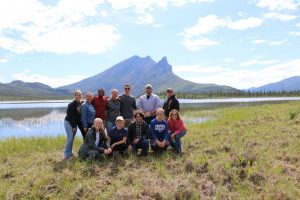
Before dinner, we had time to take a hike into the forest surrounding the campground. At the end of the hike we spent some time on a personal reflection for the backcountry-as-text assignment. This was a wonderful place because there were no human-made sounds around — one hope for this assignment. It is very difficult to visit places that are completely quiet of engines and other human-made sounds. We were very lucky in Alaska to have many such places.
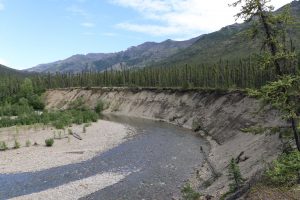
Marion Creek
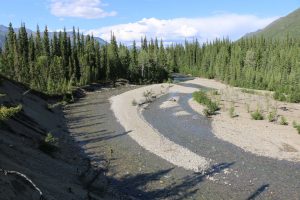
Marion Creek
Dinner tonight was spaghetti. As discussed above, we had to buy meals that would be reasonable five to seven days later.
After dinner, the students participated in their Persuasive Arguments assignment. Each student was given a ‘stance’ on the pipeline issue (possibly one that they may not agree with) and was given 4-5 minutes to persuade the other students to agree with their stance. The students did very well with this assignment — very impressive work — especially since there was only a few days to prepare their argument.
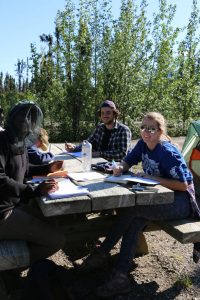
Students preparing for the Persuasive Arguments assignment
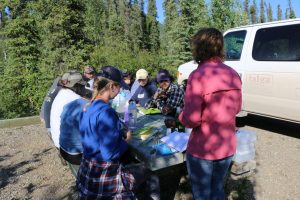
Beginning of the assignment delivery
We ended the evening with a nice conversation around the picnic table.
